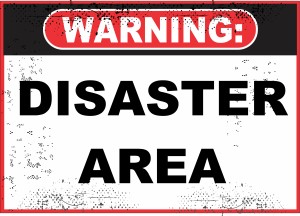Look around your office or wherever it is you do your desk work.
- Is it tidy and organized so you can focus on your work and get done what you need to?
- Do you have a system for managing your incoming mail, paper, files or documents that’s working for you?
- Do you know exactly what to keep and what not to?
- Would it take you less than a minute to find an important document or file?
If you replied YES to all these questions, CONGRATULATIONS! You’re on the right track. If you replied NO to some or all of these questions, you may be dealing with a paper crisis.
Here’s the thing: Paper, or to be more specific the information or data on that paper has a purpose, actually two purposes to ACT on it, or to RETAIN it.
Paper either prompts you to do something, like pay a bill or revise your investment portfolio or send your Aunt Sadie a birthday card, or it contains information about you (or those close to you) that you want to hold on to like a birth certificate, pictures of your kids or last year’s tax return.
 If you are reading this, most likely you keep paper you don’t actually need. Why? Because if you don’t know whether to keep it or not, chances are you keep it for fear that you may need it or be asked for it some day. It’s what I call behaving like Justin Case – as in keeping it just-in-case. Like you, Justin Case means well but if you’re not sure whether or not to keep something, chances are you are behaving like Justin Case.
If you are reading this, most likely you keep paper you don’t actually need. Why? Because if you don’t know whether to keep it or not, chances are you keep it for fear that you may need it or be asked for it some day. It’s what I call behaving like Justin Case – as in keeping it just-in-case. Like you, Justin Case means well but if you’re not sure whether or not to keep something, chances are you are behaving like Justin Case.
There are two other reasons we keep paper. The first is we are simply too busy or too overwhelmed by other priorities to deal with it or figure out a system for doing so.
The second is that for most people organizing paper is boring, time-consuming and it never seems to get done! Not very satisfying.
If this sounds like you, here are a few fear-taming tips to help you organize and manage your paper piles, files, documents and other paper clutter before the Paper Monster takes over your desk or workspace.
- Don’t start with filing: if you don’t know what you need to keep why would you spend your valuable time filing it? Instead use that time to sort your paper piles into three categories:
A for ACTION – Paper that is prompting you to do something that will move your life or work forward, or is important to you and worth your time. (filing and reading don’t count)
B for BILLS – keep these in their own container on your desk and don’t mix them up with anything else. Consider using online bill pay to cut down on stamps and envelopes.
C for CONTAIN – paper that needs to be contained only (filed for reference or safekeeping).
- Toss everything you don’t need now! This includes, but is not limited to, empty envelopes, expired coupons, old magazines or catalogs you have no time or intention of reading. Get rid of junk mail and old articles you’ve ripped out but never read or referred to as well as so-called “scratch paper” and those hundreds of little note pads you’ve collected – use a small bound notepad instead. Shred old bills from last year (unless you are claiming it on your taxes) and statements or milestone documents that have an updated version. BUT Be sure to shred anything that has your account number or personal identifying number such as your social security or medical record number.
- Understand that paper is not going away anytime soon so going paper-less is more about creating less-paper than it is about eliminating paper altogether.
- Divide your A or Action paper into High, Medium and Low Priority. If you go a week and see the High priority items not done, you may need to consider how you are setting your priorities. It may not be that important after all.
- Schedule an appointment with yourself every week to do your desk work and to complete your tasks. If you don’t do this, all the organizing will be for nothing.
- Learn what to keep and what is okay to toss. Unfortunately there is no simple formula for this but in general you should keep:
- Tax files and relevant back up for the past 3 years or 7 years if you have been filing as a business during that period. You can scan all of these if it makes sense to do so, as long as you can easily print a copy when needed.
- Vital Personal documents that verify a personal milestone such as a birth, death, divorce or are issued by the Federal government or State in which you live, such as passports and current driver’s license.
- Records of assets you currently own including titles, contracts or appraisals.
- Records of liabilities or anything you are currently paying on or owe such as unsatisfied loans, promissory notes and credit card or line of credit information. Again, these items can be scanned if it makes sense to do so.
- Current insurance policy declarations for health, home, auto or life.
Still stuck or feeling overwhelmed?
Consider hiring a professional organizer who specializes in paper management or office organizing. Check out the National Association of Professional Organizers for a list of qualified professionals in your area.
Lastly, any paper that must get done immediately, such as calling about a shut-off notice or signing your child’s permission slip for tomorrow’s field trip, don’t wait. DO IT TODAY! However, if you find you have too many of these, too often, it could be a signal that you are in crisis or chaos and need some help.
